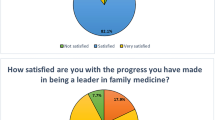Abstract
The professional process portfolio (PPP) was adopted by the Maternal Child and Health Bureau (MCHB) as an ‘innovation’ in best practice for all Leadership in Education and Adolescent Health (LEAH) Training Programs; however it had not been formally evaluated. Thus the objective was to evaluate the utility of the PPP for graduates of the LEAH training program in terms of (1) how alumni have used, adapted, and applied it since completing fellowship, (2) what fellows learned or gained through completing it, and (3) how it can be improved for continued use in training programs. Graduates from six disciplines were asked via telephone or email to participate in a survey regarding their experience with the PPP. Descriptive statistics were generated for demographic characteristics and closed-choice questions. Responses to open-ended questions were analyzed by a team of faculty using framework analysis. Sixty-one graduates completed surveys. The majority (85 %) found the PPP useful and utilized it post-graduation for multiple purposes in professional development: interviewing, training, and referencing previous work. Graduates recommended that the PPP be improved by making it electronic, discipline-specific, and providing earlier and more frequent instruction from faculty on expectations of creating it. Four themes emerged from the qualitative data analysis: accomplishment, experiential learning, skills and accountability, and a best practice of learning. The PPP was an effective personal learning tool for the majority of graduates and enhanced graduates’ experiences. We highlight the ways that the PPP may facilitate the development of learning experiences associated with MCH leadership competence.
Similar content being viewed by others
References
Driessen, E., Tartwijk, J. V., Vleuten, C. V. D., & Wass, V. (2007). Portfolios in medical education: Why do they meet with mixed success? A systematic review. Medical Education, 41, 1224–1233.
Byrne, M., Schroeter, K., Carter, S., & Mower, J. (2009). The professional portfolio: An evidence-based assessment method. Journal of Continuing Education in Nursing., 40(12), 545–552.
Buckley, S., Coleman, J., Davidson, I., Khan, K., Zamora, J., Malick, S., et al. (2009). The educational effects of portfolios on undergraduate student learning: A best evidence medical education (BEME) systematic review. BEME guide no. 11. Medical Teacher, 31, 282–298.
Davis, N. L., Myers, L., & Myers, Z. (2010). Physician ePortfolio: The missing piece for linking performance with improvement. The American Journal of Managed Care., 16, SP57–SP61.
Online Professional Development from Johns Hopkins University and Morgan State University. Portfolio Module. [cited on March 21, 2010. http://www.sitesupport.org/module1/welcome.htm.
Altahawi, F., Sisk, B., Poloskey, S., Hicks, C., & Dannefer, E. F. (2012). Student perspectives on assessment: Experience in a competency-based portfolio system. Medical Teacher, 34, 221–225.
Davis, M. H., Ponnamperuma, G. G., & Ker, J. S. (2009). Student perceptions of a portfolio assessment process. Medical Education, 43, 89–98.
Ryan, M. B. (2011). Evaluating portfolio use as a tool for assessment and professional development in graduate nursing education. Journal of Professional Nursing, 2, 84–91.
Tochel, C., Haig, A., Hesketh, A., Cadzow, A., Beggs, K., Colthart, I., et al. (2009). The effectiveness of portfolios for post-graduate assessment and education: BEME guide no. 12. Medical Teacher, 31, 299–318.
A collaborative website of the MCH training grantee network. Leadership Education in Adolescent Health/Innovations. [cited on March 21, 2011]. http://leah.mchtraining.net/innovations.php.
MCH Leadership Competencies Workgroup. Maternal and Child Health Leadership Competencies Version 3.0. June 2009. [cited on September 20, 2013]. http://devleadership.mchtraining.net/mchlc_docs/mch_leadership_comp_3-0.pdf.
Savage, G. T., Duncan, W. J., Knowles, K. L., Nelson, K., Rogers, D. A., & Kennedy, K. N. (2014). Interprofessional academic health center leadership development: The case of the University of Alabama at Birmingham’s Healthcare Leadership Academy. Applied Nursing Research, 27(2), 104–108.
Pope, C., Ziebland, S., & Mays, N. (2000). Qualitative research in healthcare. Analyzing qualitative data. BMJ, 320(7227), 114–116.
Yueh, H. (2013). Engineering students’ perceptions of and reflections on portfolio practice in leadership development. International Journal of Engineering Education., 29(1), 99–106.
Straus, S. E., Soobiah, C., & Levinson, W. (2013). The impact of leadership training programs on physicians in Academic Medical Centers: A systematic review. Academic Medicine, 88, 710–723.
Steinert, Y., Naismith, L., & Mann, K. (2012). Faculty development initiatives designed to promote leadership in medical education. A BEME systematic review: BEME guide no. 19. Medical Teacher, 34, 483–503.
Acknowledgments
This study was conducted with funds received from an Educational Project Scholarship Award through Texas Children’s Hospital and Baylor College of Medicine.
Author information
Authors and Affiliations
Corresponding author
Rights and permissions
About this article
Cite this article
Hastings, E.S., Chacko, M.R., Acosta, A.B. et al. Evaluation of the Professional Process Portfolio: An Innovative Tool to Help Develop and Demonstrate Leadership Competency. Matern Child Health J 19, 280–289 (2015). https://doi.org/10.1007/s10995-014-1606-9
Published:
Issue Date:
DOI: https://doi.org/10.1007/s10995-014-1606-9




